- Home
- Peter Carey
The Unusual Life of Tristan Smith Page 9
The Unusual Life of Tristan Smith Read online
Page 9
When my mother finally decided to read this to me, I grunted and said that that would be OK, but I was so excited that I developed diarrhoea.
*A Voorstandish character often used in the Feu Follet to represent Voorstand as a whole. It seems likely that the character has its roots in the animistic culture of the Native People of Voorstand – the famous ‘Suit of Goose-feathers’ in the Saarlim Museum bears a striking resemblance to early artists’ representations of The Hairy Man. It is only after two centuries of Christian settlement that we find The Hairy Man used as a synonym for Moloch or Satan. Even the church-sponsored Badberg Edition of The Tales of Bruder Mouse suggests an identity more like a ‘Bogey-man’ than the devil. These two identities, folk character and Christian demon, co-exist to the present day.
20
I had become a furtive, even sneaky child, one given to wild and dangerously unrealistic dreams. I devoured histories and fictions, personally identifying not only with revolutionaries but with figures like Napoleon whom I was expected to despise. I wrote: ‘J’y suis une grande Destinée’, on a cigarette paper and watched in silent satisfaction while Wally ignited and inhaled my words.
At ten years old I believed books would be written about me.
And although I said, and will say again, that I was not aware of my monstrosity, the opposite was also true: I knew exactly why I could not be an actor, and I was equally determined to become one. I also knew that if my maman saw how excited I was she would become fearful for me and send me back to Chen.
That is why, when she offered me my part in the Sirkus, I affected a passive, pathetic, half-defeated attitude, and when the actors were called the following day, I did not push myself forward amongst them. Instead I sat in the dark and watched them argue about Orestes. When I finally came into the light, it was to complain about boredom. I sat on my mother’s lap and whined and fidgeted, until finally she gave me what I had wanted all the time – a rehearsal room in one of the old stables.
There, with no one watching me, I was an egotist in the great theatrical tradition. I declaimed. I leapt into the air and landed. I scrabbled around the dirty brick floor roaring like a lion. I did my own version of ‘warm-ups’ and ‘breathing exercises’ until my clothes were covered with mud and straw and my knees were cut and bleeding.
Stanislavksy says that in order to build favourable conditions for creativeness, an actor’s organism must be prepared. The Master of the System would have clucked his lordly tongue not merely about my face and body, but also my voice – the failure of fusion in my mid-line structures meant that I would always, all my life, have trouble enunciating my words so a stranger could understand me.
To hell with that. I would make my Hairy Man a mute, something scary that jumps at you from the dark. I would base him on a spider.
This was not original, of course. I had watched my father building a character.* He would say: This character is a crab, or that character is a mole. And he would cut himself some sandwiches and go off to the zoo or the aquarium to study.
I therefore crawled around the stables, clawing at loose bricks with my broken nails, trying to find a spider so I might study it. The spiders I caught were not easy models for my instrument to follow. Their legs were fine and supple, mine were twisted, and my feet – although I hate to use the term – were clubbed. When I walked, my ankle had to do the job normally done by the sole of the foot. I had developed thick calluses all over my ankles, but to walk this way for ten minutes put strain on the knees and the hips that could cause me pain for weeks. In short, I could not do a character that walked.
My biceps were not large, but the pale blue-ish skin covered healthy muscle and I knew that muscle could be made to grow. My Hairy Man could climb and drop free-falling out of the dark sky.
There was a rusty steel ladder fixed to the courtyard wall outside my stables, and by the time the company was hammering and sawing at the new set for Orestes, I had taught myself to climb, to hang upside down for fifteen minutes. As a student I was known for my squirming and impatience, but as an actor I had that quality by which great men are often marked: their ability to endure tedium in pursuit of their obsession. By the time my absent father returned to Chemin Rouge I had calluses behind my knees, across my palms. But I could hang upside down for half an hour.
Without revealing my reason, I had found out exactly what time Bill’s flight would land. I knew when his taxi should arrive. The company, which imagined me an amiable sort of pet, would have been surprised at my deviousness. But when, at six o’clock that night, my father finally entered the theatre, he saw the Hairy Man, spotlit precisely, hanging from the ladder on the back wall of the theatre, right up near the lighting rig.
I saw Bill Millefleur, upside down, loose and handsome in his grey silk suit. He looked up at me, light reflected from his skin, his suit, his hair.
‘Hairy Man?’ he called. ‘Am I right?’
My limbs were crying out with pain, but my heart, as your great poet says, ‘was all over the heavens’.
‘He’s a spider, right?’ Bill called. ‘Your Hairy Man’s a spider?’
Beneath my blood-filled head I heard my father walk softly across the cobbled floor. He climbed up the rusty old ladder to where I hung – closer, closer – he smelt of fame, of foreign spices and dry-cleaning.
‘I’m very proud of you,’ he said, and caught me just in time. He lifted me off the rung. He held me to him, thirty feet above the floor, not worrying about the snot streaming from my nose.
‘Just be careful, OK?’
‘Thanks … Dab,’ I said.
My words were not clear and he did not understand me, but I did not care.
‘Floor-work,’ he said when he had got me to the ground. ‘I’d work on that.’ Then he ruffled my hair and went to find my maman.
There were now ten days before the tour began. Sparrow, Bill and my mother were busy rehearsing with the horses. Wally was flushing and pressure-testing the radiator on the Haflinger, assembling his mammoth tool kit – vice-lock, brake-adjusting tool, centre punch, hacksaw, heavy hammer, side-cutters. Once I would have been by his side, under his legs while he fitted tubes inside the tubeless socks, collected brass rivets, clips, blades, rubber rings, corks, bits of wire. But all these activities which had once so interested me now seemed mundane, and I abandoned Wally for my more glamorous father.
I have no excuse. I knew it hurt Wally. I saw the pain when I ate my lunch sitting in Bill Millefleur’s lap.
In the last week they brought the new horses into the Feu Follet and began to run the show. Without giving away the more spectacular part of my performance, I made my character visible. I hung upside down from the ladder where Bill could see me. And in the middle of the animal and human chaos which now filled the whole theatre, and spilled out amongst the taxis in Gazette Street, he would say, ‘Good work’, or, ‘That’s coming along.’
Having been so often and so publicly blessed, I was furious to be informed that the collective had decided not to let me perform the spider action.
Typically it was not Bill who broke this news to me, but tall, cadaverous Sparrow Glashan. He was widely known to be a decent man. It was what everybody said about him, and yet he took my action from me casually, not even noticing what it was he did.
‘But … Bill … told … me.’
‘Bill told you?’
‘It’s … much … better … than … he … saw … I … fall … from … heaven.’
Sparrow smiled and patted me.
‘Fuck … you …’
‘What?’
‘FUCK … YOU …’
Maybe he understood me. He pretended not. He said that it was only in Saarlim that they risked an actor’s life for entertainment. He said that was why it was better to be an Efican.
As for my father, I could not believe what he had done to me. I watched him, smiling, joking with the other actors.
*Although I had heard the other actors mock this process behin
d his back, I knew without being told that it was not to do with the process, but his fame in the Sirkus. Sirkus stars, it was commonly thought, could no more act than singers in an opera. They said their inane lines, but it was not acting as we did it at the Feu Follet. You, of course, will know that this opinion is born of jealousy and, further, that the assessment of Sirkus acting is ignorant and ill-informed. It is true that the standard of ‘acting’ in certain of the high-risk Saarlim Sirkuses is not high, but this is the exception, not the rule. As a Voorstander you will quickly see the inability of these provincial actors to ‘read’ a tradition of performance which is closer to Kabuki than their own. [TS]
21
Eight weeks later, three hundred miles from Chemin Rouge, Bill came around the corner of Shark Harbour Parish Community Hall, and saw THE HAIRY MAN – already five feet off the ground.
At first he did not know it was the Hairy Man. All he saw was me, snotty, white-eyed Tristan, doing something dumb and dangerous. He started hollering my name.
This drew Wally out from under the half-erected tent, his head thrust forward like a turtle. He was followed by my maman, crawling on her knees, carrying a mug of coffee.
‘What is it?’ she called to Bill. ‘Are you OK?’
Wally tried to grab me by the leg, but I was the Hairy Man, and he was only human. I pulled away from him. He tried to follow, and you would think he was made to fit a tree – his legs were Louis Quinze, and his biceps prominent – but he scratched and scrabbled and could not hold.
‘No, wait,’ Bill said to Wally. I heard this. I heard it clearly. ‘Wait, I know what he is doing.’
Whatever joy this understanding unlocked in my heart, it produced the opposite effect in Wally’s. He had been polite to Bill until this moment, but now all the passions he had bottled up came rushing out, and he was so mad – at Bill, at me, my mother – he picked up pine cones and hurled them up the tree. ‘You’re never here,’ he said to Bill. ‘Don’t play the father now.’
A pine cone hit my ear.
‘Come down, you little prick.’
‘Wally,’ my maman said. ‘That’s enough.’
By then the Hairy Man was already fifteen feet above their heads. I dragged my running nose upwards, past lines of ants. I pressed my cheek hard against the corrugated bark as if skin alone might keep me stuck there, and watched, from an inch away, the ants congregate around the snot-smeared bark.
I now waited for my maman to understand my action. Not a word came up to me. Her silence went on and on, pushed me up and up. When I finally looked down, I was perhaps forty feet from the earth.
My audience was all spellbound – Wally pale, my father smiling, but my maman was so still, so intensely still. She held her windblown curls back from her eyes, squinting up at me. My arms were an agony. My legs hung like tails. But there was nothing I would not have done to maintain the private look of admiration that I found in her face. So although I dared not hang as I had planned, I turned and climbed.
I will not easily forget the boiling green ocean I found up that tree, or the blustering easterly which swept the sea spray up the cliff face and stung my broken skin as delicately as Vincent’s eau de Cologne, or the resinous sap, rich in pine or the mouettes, their wings white, their eyes orange, who came squalling around me as I, unknowingly, approached their rough-stick nest.
Everything smelt of salt and seaweed. It was as if I had finally ripped through the Glad wrap that had always separated me from my true history.
Far, far below me was my silent mother. She stood beside the grey weather-board hall, her eyes creased but still young and beautiful, her red anorak wrapped tight around her, her black skirt flapping like a flag against Wally’s bent grey flannel legs.
‘Watch him,’ I heard her say. And felt, even from that distance, that she and I were in communion.
Wally said, ‘For Christ’s sake.’
The wind blew her answer away.
All I heard Bill say was, ‘… kid.’
‘He knows,’ my mother answered.
What did I know? I knew nothing. I knew only that I was weak, in pain, delirious with fear and pleasure, that the branch I was edging out along was bending, that I might die a famous death, that the sky was a brilliant cobalt blue, that the birds were hitting me with their wings, that the wings did not hurt, that I did not know how to go backward. I froze. ‘Just watch him,’ my mother said. ‘He knows what he’s doing.’
Just the same, I was very pleased to hear Bill say, ‘Maybe we should get a ladder.’
I began, obligingly, to shift into reverse. But my legs would not go backwards. The birds were coming back. I shut my eyes, opened them. I could see their nest ahead of me, a bundle of sticks with a toffee wrapper woven into it. If I were a Famous Actor, what would I do? I had no choice but to perform my action, to edge towards the nest. There were four eggs, pale blue with brown spots. I would stay in character, till the death.
‘What good is a fucking ladder now?’ Wally shrieked. ‘What would I do with a ladder?’
The branch was dipping and swaying. I leaned forward and pressed my face deep into the nest.
THE HAIRY MAN took one egg in its maw. He held it there, trying to breathe around it.
‘You should listen to me,’ Wally shrieked. ‘Not wait for this to happen.’
THE HAIRY MAN wanted to throw up. He could taste bird shit in his mouth.
I breathed through my nose and managed to make my arms go backwards. I knew I wasn’t going to die my famous death just yet. I began to experience the feeling of what I would later know when I did my first show in Saarlim – a feeling of intense well-being which was not contradicted, but rather amplified by the pulsing pain in my arms. I came down the tree, my arms feeling warm and sticky with blood, and shrugged myself free of my mother’s eager embrace.
“Ah,’ I said. ‘Uh-uh-UH.’ Finally she saw it: the egg in my mouth.
She held out her palm, her eyes bright, that bright, bright look, love-bright, nothing like it, and started laughing. Her coat was marked with my blood, her cheek pink from my blood.
‘You can start a collection,’ she said. ‘I’ll buy you a book about birds.’
‘You’re insane,’ Wally was saying. I thought he meant my maman, naturally.
He grabbed me and held me so hard it hurt – chin, zipper, arms too tight around the chest – tobacco, stale sweat, rubber, liniment oil for his bad knee. ‘You’re crazy,’ he said as he released me and patted down my snotty hair.
‘Relax,’ Bill said. ‘It’s the circus in his blood.’
‘You keep out of this,’ Wally said to Bill, and then, to my maman, ‘I never want to see something like that again.’
‘I don’t think you’re going to have a choice,’ my mother said.
She put her hand on my head and stroked me. ‘Do you want to see how to keep the egg?’ she asked me. And she showed me there, beside the old rusting tank stand. She made a small hole in each end of the egg and blew its contents.
‘That is the mouette’s baby,’ Wally said. ‘Is that what you want to teach him?’
‘I want him to be strong and brave,’ Felicity said.
‘You can’t teach that,’ Wally said. ‘It’s how he is. He is, anyway.’
‘That’s right. He is.’ And she gave me back the egg, now light and as slippery with egg white as my own skin was with blood.
22
Two weeks before the Hairy Man climbed the tree, my father had gone to find a Saarlim newspaper in a provincial mall.
He had left my mother sitting on the bumper bar of the Haflinger, eating vanilla ice-cream. He had walked down into the shining wet-floored mall, dressed in rumpled faded dungarees and a plaid shirt, but he carried with him still, in spite of the ordinariness of his dress, his stardom – the softness of his skin, its sheen.
As he walked along the deserted early-morning mall he was very happy to be exactly where he was. There had been a full house the night before. There was
another full house tonight. The day was clear-skied, eighty degrees. He planned to spend the morning fishing from a clinker boat.
Bill returned to Efica in the summers as other actors, his colleagues in Voorstand, went off to climb mountains in Nepal, to retain touch with something basic which his real life made impossible to know.
Here in the islands of Efica there were circus, theatre, horses, solitude, conflict, battles you could imagine might be won. Here, working for peanuts in a shitty little tent on the edge of the crumbling coast of Inkerman, playing to hatchet-faced oyster farmers, you could forget the franchised Sirkus Domes and the video satellites circling above the ozone layer, and you could imagine that theatre could still change the destiny of a country. In Efica you could have the illusion of being a warrior in a great battle, and when you toured you lived with others who shared the same illusion. When you toured, you performed as if art mattered. Doing agitprop under a petite tente you were inventing your nation’s culture.
And he was – although he was to forget this in a moment – pleased to see his face in the large blue Sad Sack Sirkus poster at the news stand, pleased to be important in his own country. And when the voice called out his name, ‘Bill Millefleur,’ he turned, as an actor turns towards the light.
He saw two youths in their teens, conservatively dressed in three-button suits.
‘Hi, fellahs,’ he said.
So convinced was he of the scenario that when the button-nosed one drew out a box cutter, Bill’s brain insisted that it was – against all the physical evidence to the contrary – a pen.

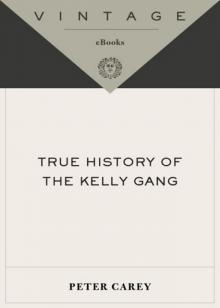 True History of the Kelly Gang
True History of the Kelly Gang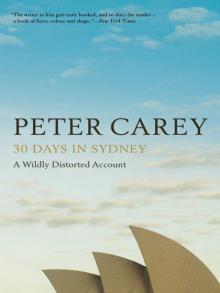 30 Days in Sydney: A Wildly Distorted Account
30 Days in Sydney: A Wildly Distorted Account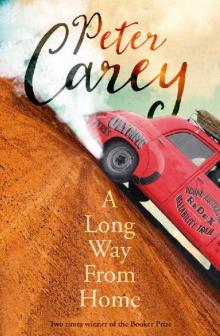 A Long Way From Home
A Long Way From Home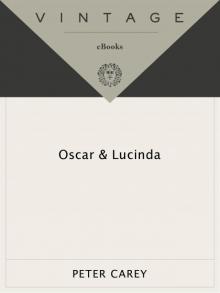 Oscar and Lucinda
Oscar and Lucinda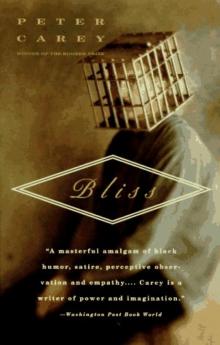 Bliss
Bliss Wrong About Japan
Wrong About Japan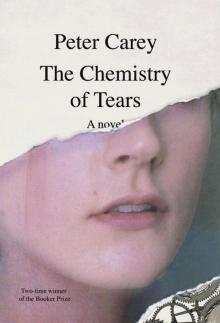 The Chemistry of Tears
The Chemistry of Tears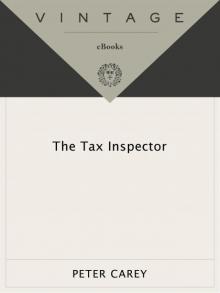 The Tax Inspector
The Tax Inspector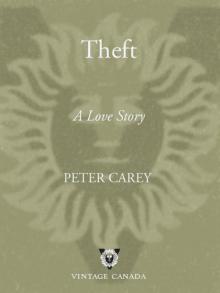 Theft: A Love Story
Theft: A Love Story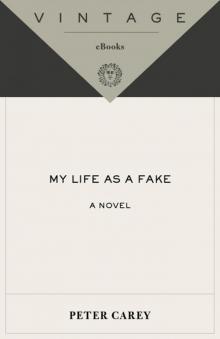 My Life as a Fake
My Life as a Fake Collected Stories
Collected Stories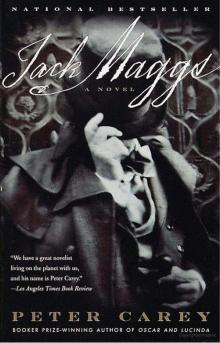 Jack Maggs
Jack Maggs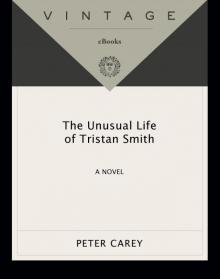 The Unusual Life of Tristan Smith
The Unusual Life of Tristan Smith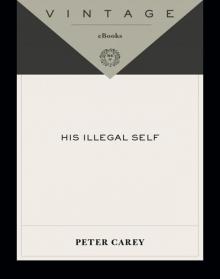 His Illegal Self His Illegal Self His Illegal Self
His Illegal Self His Illegal Self His Illegal Self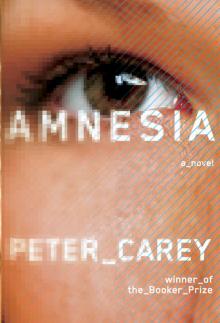 Amnesia: A Novel
Amnesia: A Novel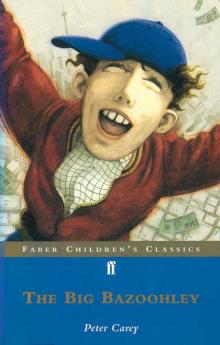 The Big Bazoohley
The Big Bazoohley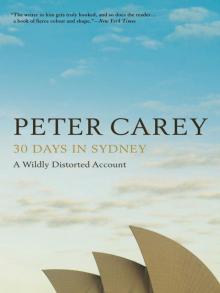 30 Days in Sydney
30 Days in Sydney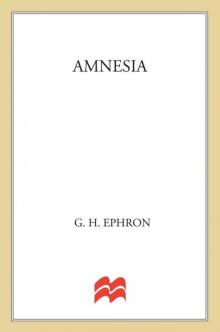 Amnesia
Amnesia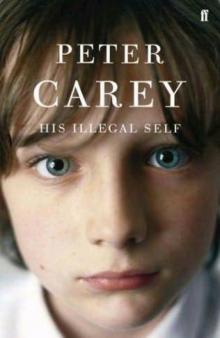 His Illegal Self
His Illegal Self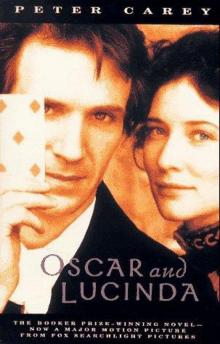 Oscar and Lucinda bw-1988
Oscar and Lucinda bw-1988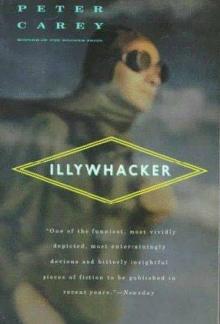 Illywhacker
Illywhacker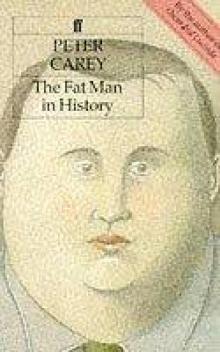 The Fat Man in History aka Exotic Pleasures
The Fat Man in History aka Exotic Pleasures